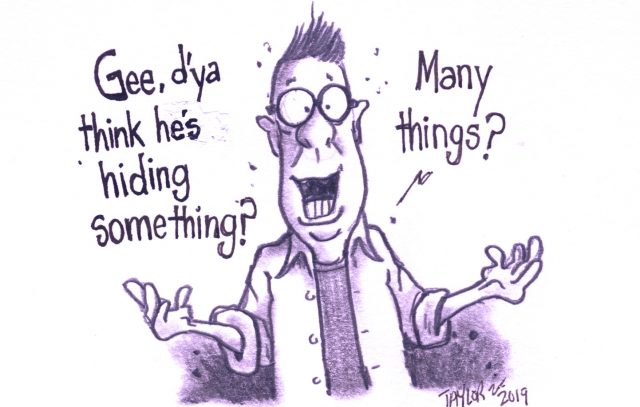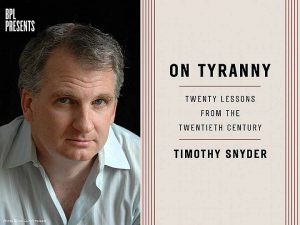
By Dan Peak
The Commoner Call (4/8/19)
Dear Fellow Readers,
Which is the bigger fight:
- Trump against releasing his taxes,
- Trump against releasing the Mueller report that he said we should all see, or
- Trump against release of his grades and test scores?
Seems like the best answer is what day is it? With Trumpian assaults from all sides and every angle, any single story can easily get lost. As an example, it isn’t just that Trump is facilitating a Saudi nuclear program, we now know the first Saudi nuclear reactor will likely come online this year.
Is there bandwidth enough to note that a one-time GOP presidential candidate that dropped out after multiple accusations of sexual assault may now be Trump’s nominee for the Federal Reserve? Trump stands accused of his own many instances of sexual assault and while there are many news stories citing Herman Cain’s woeful lack of qualification there are fewer reminders accusations of sexual assault.
Is there ever a Trump appointee without mountains — mountain ranges — of baggage?
There are three themes for this edition:
- First has to be a very real risk of Attorney General William Barr’s possible effort to repress the Mueller report on Trump-Russia.
- Second, we’ll revisit the ‘voice’ from the left about Trump-Russia.
- And last we’ll squeeze in a few headlines of the ever-expanding coverage of Trump criminality.
The ‘short-circuit’ expert
With Barr we’ll start with a new wrinkle: Limited Information Barr Has Shared About Russia Investigation Frustrated Some On Mueller’s Team.
“… members of Mueller’s team have complained to close associates that the evidence they gathered on obstruction was alarming and significant.
““It was much more acute than Barr suggested,” said one person, who, like others, spoke on the condition of anonymity because of the subject’s sensitivity. …
“Summaries were prepared for different sections of the report, with a view that they could made public, the official said.
“The report was prepared “so that the front matter from each section could have been released immediately — or very quickly,” the official said. “It was done in a way that minimum redactions, if any, would have been necessary, and the work would have spoken for itself.”
“Mueller’s team assumed the information was going to be made available to the public, the official said, “and so they prepared their summaries to be shared in their own words — and not in the attorney general’s summary of their work, as turned out to be the case.””
Recall Barr’s actions and his preceding reputation for insights about the risk that Barr is burying Mueller’s Trump-Russia report to benefit Trump.
A reminder – polling shows as much as 80% of Americans want the Muller report released soon and in full, including a majority of Republicans.

Despite the wishes of the nation: Scrutiny & Suspicion As Mueller Report Undergoes Redaction.
Here lies one of the fears over Barr’s definition for redactions – “…give Barr significant latitude to decide what to leave in and what to take out of the report’s public version, none more so than the grand jury material”. There is certainly a good deal of grand jury information given “Mueller’s investigators issued more than 2,800 subpoenas and executed nearly 500 search warrants”. Barr announced he views grand jury information as one of his four categories of redaction, this is considered against legal opinions suggesting this should not be extensive, according to Duke University law professor Walter Dellinger.
“The amount of legitimate redactions should be quite small,” Dellinger said. “I don’t believe there is any reason to redact any material for the sole reason that it is derived from grand jury proceedings.”
More importantly, there is precedent for releasing all grand jury information, Dellinger adds, “It’s disturbing there has been no announcement of any effort to ask the presiding judge of the grand jury to clear the material.”
The debate over redactions and grand jury information sits within a more troubling framework of concern over Barr actions to characterize the report’s outcome to the benefit of Trump.
“And yet Barr chose to share so little in his letter summarizing the key findings, which he later claimed wasn’t really a summary of the report at all. Barr bemoaning Mueller’s refusal to render a decision on Trump’s liability for obstruction of justice is rich considering that it is the Justice Department’s own guidelines that prevent prosecution. (In Watergate, the independent counsel submitted a road map to Congress, since he well understood it is Congress’s job to consider impeachment.)”
Barr’s actions to date are a troubling but also clear violation of the special counsel process:
“But wait a minute: Did Mueller’s decision not to make a call mean that it was Barr’s decision to make? There is nothing that automatically gives Barr that power. Perhaps Mueller intended to leave the decision on obstruction to Congress, not to Barr. Maybe Mueller was silent on this issue in his report. Maybe he wasn’t. We can’t know, because we haven’t seen the report.”
Which brings us to the challenges of Barr’s reputation and shady past behavior in previous investigations of a republican president: The “Reputational Interests” Of William Barr.
The article covers similar concerns over Barr’s process and statements, setting himself up as “sole authority to decide”, but adds this:
“Barr’s effort to discredit the Mueller investigation should have brought to mind the not-so-distant history of his first stint as Attorney General, under George H. W. Bush. In 1992, just as Bush was leaving office, he issued, with Barr’s support, pardons for six Reagan Administration officials—including the former Defense Secretary Caspar W. Weinberger—who had been either charged for or were convicted of crimes connected with covering up the Iran-Contra affair and its violations of the U.S. Constitution. Weinberger’s pardon came before his case went to trial, and it was commonly believed that it was itself part of another coverup, to prevent the presentation of evidence that would have indicated Bush’s personal involvement in Iran-Contra, when he was Reagan’s Vice-President. Thanks to the pardons, the whole truth was never known.”
Note “with Barr’s support, pardons for six Reagan Administration officals…”
Consider this against Barr’s very first action to issue a communication favorable to Trump:
“The more the story unfolds, the deeper Barr’s interference appears to be. According to reports in the Times and the Washington Post, Mueller’s staff prepared summaries of each section of the report, which, according to one staff member, they intended for release “immediately—or very quickly” after it was delivered.”
We heard from Barr, not Mueller. Barr offered his three-and-a-half page summary of a detailed 400-page report in lieu of Mueller’s summaries.
This may well be Barr’s second effort to protect a Republican president.
“…included “evidence of a conspiracy among the highest-ranking Reagan Administration officials to lie to Congress and the American public.” The episode was a textbook lesson on how to short-circuit an independent counsel’s investigation and suppress damning evidence that investigators had uncovered—and William Barr was in the middle of it.”
You can also watch Thom Hartmann’s interview JFK historian Lamar Waldron who lays the shadowy tracks reord of Barr’s credibility: William Barr: Nixon to Trump, Covering Up Republican Crimes.
*****
Crime from a neoliberal hellscape
The second theme is positive view of the Trump-Russia investigation from the left. Lefty authors Glenn Greenwald and Matt Taibbi are oft cited as voices from the left critical of Trump-Russia. Yet author David Klion finds the common ground: Russiagate Is Ending Like Any White-Collar Crime.
The article’s subhead notes: That’s an undeniable scandal. Just ask Glenn Greenwald and Matt Taibbi.
We can think of no disagreement with Klion’s statement:
“Russiagate is best understood as a story of international white-collar crime. I’ve argued this point in various publications since the 2016 election. While cable-news conspiracists were making Donald Trump out to be a literal foreign agent and some left-leaning commentators were denying the mere existence of a Russian interference campaign, I tried to emphasize post-Soviet Russia’s transformation into a neoliberal hellscape, the way oligarchic fortunes from Russia and other countries have been laundered through luxury real estate in cities like New York, and the corrupting effects of globalized capitalism.”
The author predicts the Mueller investigation will end with no accountability for Trump and his “dalliances with Russia” while citing the real crime:
“…this is how white-collar crime stories usually pan out.
“The problem with counting on the criminal justice system to save us from Trump is that the entire system is rigged. In theory, the attorney general is supposed to operate independent of the president. In practice, everyone knows that William Barr was handpicked by a president who has sought to impede the Russia investigation, that Barr took office openly skeptical of Mueller’s efforts, that he has participated in high-level cover-ups before, and that he was confirmed on a party-line vote by a Republican Senate that has every incentive to make this story go away.”
Klion cites the work of Glenn Greenwald using his words from the introduction to his 2011 book With Liberty and Justice for Some: How the Law Is Used to Destroy Equality and Protect the Powerful:
“…persuasively lays out the case that the wealthy and politically connected operate with legal impunity. “Those with political and financial clout are routinely allowed to break the law with no legal repercussions whatsoever…”
The author even references a “glowing cover blurb(s) from MSNBC anchors Rachel Maddow”, one of the purported bogeymen for getting the story wrong.
There are far more productive ways to find common ground with Trump illegalities than the current crowing over who got it right in an environment of ‘exoneration before an actual report’. It’s as if the finger-pointing isn’t so much about Trump-Russia as it is about other unresolved arguments.
To that point: Coverage of the Barr debacle shows the media learned nothing from 2016 failures.
Writer Eric Boehlert offers that many media outlets are “walking it all back” after parroting the exoneration story upon further consideration of Barr’s actions. Boehlert offers similar common ground as expressed above though from a different point of view.
In a nutshell, Boehlert is puzzled over how Trump administration pronouncements are so often “treated as truth”; in this case the root of the pronouncements were Barr’s:
“In this case, the Barr failures were immediate. Rather than going with accurate headlines, such as “Trump’s attorney general claims Mueller has cleared the president,” newsrooms just tossed all context aside and ran with GOP-friendly proclamations: “Mueller finds no conspiracy” (Washington Post), “Mueller finds no Trump-Russia conspiracy” (New York Times),” Mueller finds no Trump-Russia conspiracy” (Politico), “Mueller doesn’t find Trump campaign conspired with Russia” (Wall Street Journal), “Mueller finds no Trump collusion, leaves obstruction open” (Associated Press).“
While we imagine some Trump-Russia finger-pointing is about the shortcomings of Clinton in the 2016 election, Boehlert draws the same observations of failure but from a view of how the media favored Trump.
“And yes, we’ve seen this unsettling show before, namely during the 2016 presidential campaign season. Following that debacle, most in the press refused to concede mistakes had been made, let alone offer up much serious self-reflection. It’s simply not possible for news organizations to screw up as badly as they did in 2016, not deal with the shortcomings, and then expect journalism during the Trump era to improve. During the campaign, the media failures were manifest—they treated Trump like a celebrity and let him essentially get away with running a substance-free campaign, while every Hillary Clinton utterance was dissected in on obsessive search for hypocrisy and bad faith. Additionally, the press essentially eliminated policy coverage for Clinton because they spent so much time on their blind “But Her Emails” pursuit.”
These two views are not mutually exclusive but we seem destined for now to debating them as if one must be true and the other wrong. Why is that?
*****

One view is that what is deemed as Trump-Russia over-reaction wouldn’t have happened if Russian history was properly understood. Yale history professor and author Timothy Snyder explains Trump in the context of a Russian world-view. Whether Trump actively colluded, he is certainly a good fit with Russia’s efforts to advance their own standing through disruption with Trump being only one initiative of many focused primarily in Europe. Link to 15-minute video.
Here is an intro blurb from the video: “Timothy Snyder is a historian at Yale University, specializing in eastern Europe, totalitarianism, and the Holocaust. His books have received widespread acclaim. His most recent book, “The Road to Unfreedom: Russia, Europe, America,” tells the whole Russia story, from beginning to end, in a way that makes sense and reveals the big picture.”
*****
Just takin’ a dip at Trump’s Mar-a-Lago
So if we all agree the over-arching story is Trump criminality, let’s consider new development regarding the potential Trump Mar A Lago China scandal: Mystery Man In Trump’s Mar-a-Lago/China Scandal Prompts Counterintelligence Concerns.
The subhead reads like a cheap spy novel: Charles Lee, possibly linked to the intruder at Trump’s club, has ties to Chinese government and Communist Party outfits.
“The news revealed “a true cloak-and-dagger turn when a federal court filing revealed that the Secret Service had arrested a Chinese woman named Yujing Zhang, who on March 30 had allegedly tried to enter Mar-a-Lago… Zhang was carrying four cell phones, one laptop, an external hard drive, and a thumb drive allegedly containing malware. According to an affidavit filed by a Secret Service agent, Zhang, after first claiming she was at the club to go to the pool (she had no bathing suit), said that she had come to Mar-a-Lago to attend an event held by the “United Nations Chinese American Association” and that she had been sent there by a friend named Charles who had “told her to travel from Shanghai, China, to Palm Beach, Florida, to attend this event and attempt to speak with a member of the President’s family about Chinese and American foreign economic relations.””
We won’t connect all the dots because there will certainly be more, but the article notes links between Zhang, former massage parlor entrepreneur Li “Cindy” Yang, the arrest of Trump friend and Patriots owner Robert Kraft, and now a Chinese businessman with ties to the Chinese government, Charles Lee.
Another story reinforcing other mounting concerns about Trump administration security risks: Jared Kushner Identified As Senior White House Official Whose Security Clearance Was Denied By Career Officials.
“The senior White House official whose security clearance was denied last year because of concerns about foreign influence, private business interests and personal conduct is presidential son-in-law Jared Kushner, according to people familiar with documents and testimony provided to the House Oversight Committee.
“Kushner was identified only as “Senior White House Official 1” in committee documents released this week describing the testimony of Tricia Newbold, a whistleblower in the White House’s personnel security office who said she and another career employee determined that Kushner had too many “significant disqualifying factors” to receive a clearance.”
The article also notes, “Among the nations that discussed ways to influence Kushner were the United Arab Emirates, China, Israel and Mexico, current and former officials said”.
*****
Dems are going after Trump criminality on many fronts: “The chairman of the House Ways and Means Committee asked the IRS on Wednesday for six years of President Trump’s personal and business tax returns, a request with which the president immediately said he was not inclined to comply.”
Trump says he is under audit but Acting Chief of Staff Mick Mulvaney goes further saying Dems will “never” see Trump’s tax returns.
*****
Barr represents a real risk of burying Mueller’s report. Meanwhile the broad investigation of Trump’s criminality continues on an increasingly broad front.
There are far more areas of agreement over how to proceed. Some of the finger-pointing is less about how to lessons learned than who was right-or-wrong. There should be a common focus.
(Commoner Call cartoon by Mark L. Taylor, 2019. Open source and free for non-derivative use with link to www.thecommonercall.or )

